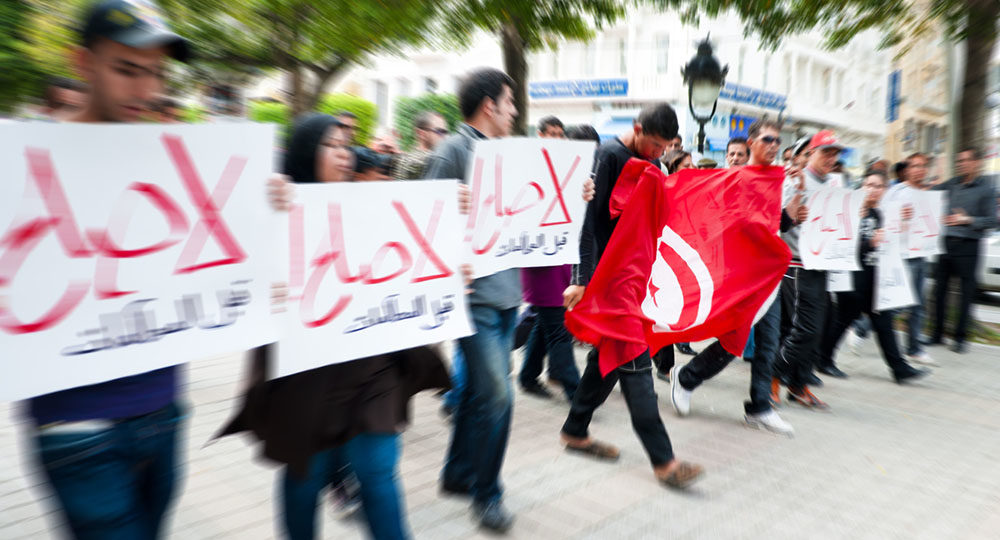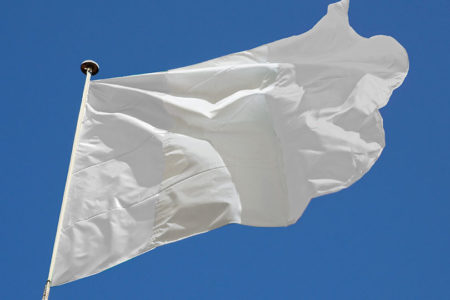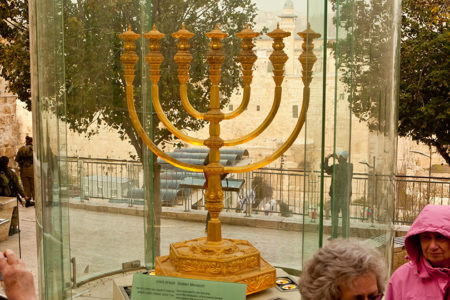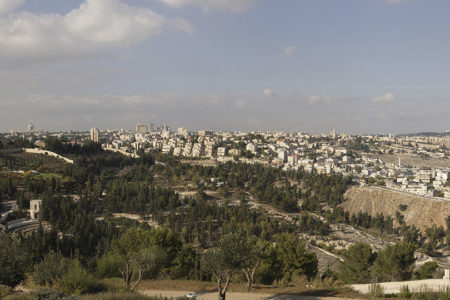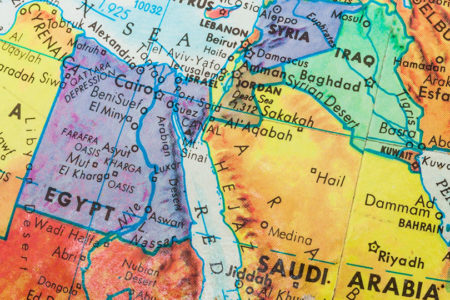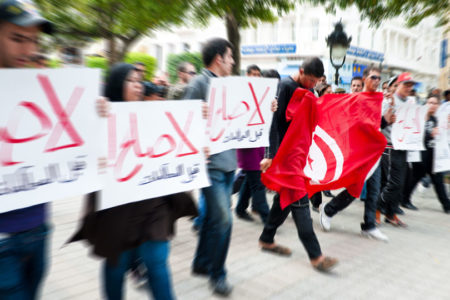The Arab Revolts and Israel
When Tunisian President Zine El Abidine Ben Ali was ousted from power in January 2011, no one in Israel or anywhere else could have forecast the major revolution that was beginning to unfold in the turbulent Arab world. Some Israeli Middle East analysts noted at the time that the domestic conditions that sparked the upheaval in Tunisia—widespread government corruption, rising food costs, high unemployment, and a lack of freedom of speech—prevailed in most other Arab countries as well. Today, however, the situation that once seemed of great interest has become one that directly impacts the Jewish state’s security.
The political revolt in the small North African country snuggled between Libya and Algeria along the Mediterranean coast began in a most unlikely manner. A 26-year-old street vendor in Tunis named Mohamed Bouazizi set himself on fire on December 17, 2010, perishing several weeks later. He had informed friends beforehand about his planned immolation, saying he would take the drastic action to protest the municipal officials’ confiscation of his street wares, which he claimed they did in a harassing and humiliating manner.
The young Muslim quickly became a new shahid, or “martyr,” in the eyes of Arabs throughout the region, especially young people. His dramatic death sparked off anti-regime protests all over Tunisia. The street demonstrations were extensively covered by Gulf-based satellite news networks viewed by millions of Arabs in every part of the Middle East.
After President Ben Ali fled his country following 23 years in power to seek refuge in Saudi Arabia, the holiest Muslim country on Earth, a new government was formed. Its leaders promised to enact political and economic reforms. Recognizing that Arabs everywhere deeply admired the vendor’s drastic action, government officials later released a stamp with his picture on it. Songs about Bouazizi sprang up all over the region, hailing his willingness to commit suicide, rather than live any longer under the thumb of a repressive dictatorship.
By early February 2011, similar anti-government demonstrations were breaking out in Egypt, Algeria, Jordan, and Yemen. Later they spread to Libya, Morocco, Iraq, Bahrain, Syria, Jordan, Lebanon, and Mauritania. The burgeoning protest movement was quickly dubbed the Arab Spring by the international media, which rushed correspondents to many of the affected countries to cover the spreading upheaval.
The name came from earlier revolutions like the Prague Spring, which began in January 1968 with the election of reformer Alexander Dubcek as the head of the Czech Communist party. However, that popular revolution was crushed the same year by military forces from the Soviet Union and other Eastern Bloc countries. In the Arab world itself, the protest movement quickly gained the moniker Arab Awakening, although Iranian Shiite Muslim leaders later termed it an Islamic revolution.
The most dramatic development of this early period was the fall from power of Egyptian President Hosni Mubarak on February 11, 2011. Journalists covering the story noted that Facebook and other social networks were widely employed in rallying anti-government demonstrators, especially younger ones, to take to the streets. The massive rallies in Cairo and elsewhere caused the embattled Egyptian president—in power for nearly 30 years—to order his security forces to suppress the demonstrations with violence. Hundreds of protesters were slaughtered, and many others were incarcerated.
Mubarak knew his days in office were numbered when the leaders of his closest ally, the United States, called on him to halt the brutal suppression and told him he needed to step down.
Impact on Israel
With Mubarak’s downfall, the mushrooming Arab revolts mutated from being of great interest to the Israeli government and people to a story that directly touched the Jewish state’s vital security interests.
After all, Israel’s 1978 peace treaty with Egypt—the Arab world’s largest and most influential country—has been the cornerstone of its foreign and military policy for three decades. The prospect that “democratic reforms” in Egypt might lead to the eventual abrogation of the U.S.-brokered Camp David treaty was immediately and heavily discussed in the wake of Mubarak’s stunning ouster.
Israeli officials and the general public were initially reassured when it became clear Egypt’s American-trained and funded military, now under the authority of Vice President Omar Suleiman, remained in overall control of Egypt—a country where the birth rate is incredibly high, poverty rife, and jobs scarce.
Still, the announcement that Mubarak would be placed on trial on charges of premeditated murder of peaceful street protesters sent shivers up many Israeli spines. If such a previously unthinkable thing could happen to Israel’s closest (and nearly only) Arab ally, what else was possible in the explosive region?
Despite their concerns, most Israeli leaders publicly welcomed the intervention of NATO forces in the Libyan civil war, designed to help remove the dictator Muammar Gaddafi and his family regime from power. Known for his occasional anti-Israel tirades and support for Palestinian terrorist groups, Gaddafi’s violent death in October 2011 after 42 years in office brought relief to many in Israel.
However, officials expressed growing anxiety as evidence mounted that Libyan weapons, including rockets, were being smuggled across northern Egypt to the Hamas-ruled Gaza Strip. This only added to Israeli suspicions that the main actors in the supposedly “democratic” Arab revolution were Muslim fundamentalists who would end up enforcing stringent Islamic policies similar to those of the radical, Iranian-backed Palestinian group that controls the Gaza Strip.
Meanwhile, the Muslim fundamentalist al-Qaida group, which attacked the World Trade Center in New York City, became deeply involved in the struggle to oust Yemeni President Ali Abdullah Saleh who, in typical Arab-world fashion, had ruled the strategically located country with an iron fist since 1978. The leaders of neighboring Saudi Arabia expressed alarm when Islamic militants seized con-trol of the town of Rada in Yemen on January 13 this year, pledging their allegiance to the Egyptian-born Ayman al-Zawahiri who replaced the assassinated Osama Bin Laden as leader of the terrorist group in May 2011.
Israeli fears that the various Arab anti-government revolutions would end up bringing Islamic fundamentalists to power throughout the region were confirmed when Muslim political parties triumphed in national elections held in Tunisia and Egypt. Earlier, victorious Libyan rebel leaders had declared that any existing laws not fully conforming with strict Islamic Sharia law will be considered null and void. During its successful triumph in elections for Egyptian parliament, the Muslim Brotherhood’s “Freedom and Justice” party vowed to ban all alcohol sales and mixed-sex beaches in the country. Middle East analysts warned the move will cripple the vital tourism industry, one of the destitute country’s main sources of foreign currency.
However, the greatest concern in Israel is a Muslim Brotherhood pledge to hold a national referendum on the Camp David peace treaty. This came as Israel’s prospects of war with Syria seemed to increase.
With Iran’s nuclear development program continuing apace as its leader vowed afresh to annihilate Israel, the region is dangerously poised on the edge of an explosive precipice as the second year of the Arab revolt continues.
